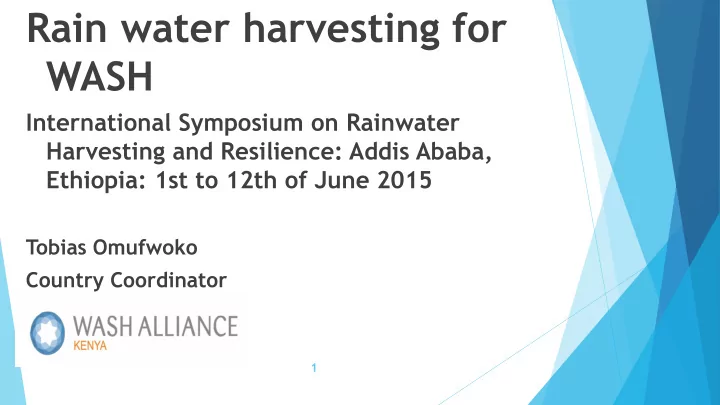

Rain water harvesting for WASH International Symposium on Rainwater Harvesting and Resilience: Addis Ababa, Ethiopia: 1st to 12th of June 2015 Tobias Omufwoko Country Coordinator 1
The WASH Scenario WASH is an acronym for Water, Sanitation and Hygiene. These are basic human rights, and also critical enablers for: Health Gender equity Economic development Clean environment (link to climate change) Globally in 2015: 2 billion people have no access to safe sanitation 800 million people only have access to unsafe water sources Progress in achieving the Millenium WASH goals is slow, mainly complicated by exponential population growth and urbanisation. Sustainable Development Goal is to have Universal access in 2030 2
WASH CHALLENGES Water Resource Scarcity Inadequate Water Supply Water Quality - This is as a result of pollution of water resources Water Governance - This challenge is due corruption, commercial vested interest and inefficiencies in the sector. Catchment Degradation Increasing Population Cultural Beliefs and Attitudes - This has mostly affected achievements in sanitation improvements and especially with regards to open defecation. Limited Resources - to develop water supply and sanitation systems. Sustainability of WASH options 3
ACTIVITIES 1. Infrastructure development and technological transfer Construction of sand dams , earth pans , rock catchments , shallow wells, spring protection and roof catchment systems in communities and schools. Technology transfer - : in order to ensure sustainability projects should incorporate transfer of critical skills to the local community including: On the job training of local artisans Training local people on operation and maintenance of water facilities and low cost sanitation construction technologies. Capacity build local organizations on low cost sanitation construction techniques & manual shallow well Other activities include Urban WASH 4
ACTIVITIES 2. Water governance, advocacy and policy A major drawback to WASH efforts is the impact of poor governance and its most salient manifestations on the effective delivery of vital services. Advocacy for better governance in basic WASH services by moving beyond denunciation to promoting practical solutions to improve public sector accountability, and this involves: Policies and strategies Awareness-raising campaigning Building cross-sectoral coalitions Policy dialogue with policy makers in government Developing water integrity management tools for Water Service Providers Budget Tracking 5
ACTIVITIES 3. School sanitation and hygiene: The average students-toilet ratio in the country stands at around 1:90, which is well below the WHO recommended ration of 1:30 for boys and 1:25 for girls. The activity involves: Construction of gender friendly sanitation blocks in schools to ease toilet congestion. School teachers trained on formation and sustenance of school based WASH clubs and Child Health and Sanitation Transformation (CHAST) as trainers of trainees (ToTs), School based WASH clubs formed in the schools to serve as avenues for sanitation behaviour change communication. Through these WASH clubs, conduct school open days on WASH activities as a means of sensitization and awareness creation on WASH. Hand washing with soap All these activities require water 6
ACTIVITIES 4. WASH Financing Setting up of a WASH guaranteed funds - through local Microfinance Institutions to trigger WASH investments for sustainability Capacity building on proposal and business plan development : Training of Small and Medium Enterprises/groups and WASH committees on: Business start-up model which will entail identification of markets, appropriate service models and products, forecasting potential costs and revenue and legal aspects of starting businesses Business Growth Model which entail assessing their businesses, identifying opportunities for growth, planning for the growth and managing expansion of their businesses. WASH guaranteed loans scale up: Support SMEs/groups and stakeholders to deliver their interventions by facilitating development of sustainable local financing options aimed at supporting WASH investments. Subsidies for water provision for WASH 7
Reflections Consider most Rain water harvested as used for WASH: whether intentionally or not, because water is life. Consider WASH Financing :Grants, Government subsidies, PPP , Equity and Inclusion Acceleration of WASH access and use. 8 Sustainability - Fiets
Recommend
More recommend